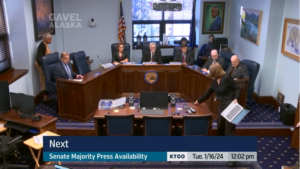
The Alaska Senate Majority held a press conference on Tuesday, January 16th, to discuss the beginning of the second session of the 33rd Alaska State Legislature.
Senator and President Gary Stevens of Kodiak (District C) opened the meeting by sharing some of the most important issues the senate will discuss while in session.
“We have put education on the very top. The 2nd is working on the retirement and pension plan, and the third is on energy issues. Also [any] other issues out there that are very important to us, we’ll be working on this session,” said Stevens.
Education
A question was asked about whether the caucus supports calling a joint session for the purposes of a veto override of the governor’s education veto and whether have there been discussions with the House toward that end?
Stevens says that he has spoken with the speaker of the house, as well as other members, to ensure that education is the number one priority. He mentions that the caucus supports an increase in the BSA (Base Student Allocation), but the senators are waiting to hear from the House about what the official plans are.
“The Rules Committee is meeting on Wednesday at 4:00 so we are anxious to hear what they do with Senate Bill 140, which I assume, as I’ve heard, would include some BSA funding. So, we’re not sure what that is, we have not heard that, but we’re encouraging them to send us a bill that we can that we can that we can work on and deal with and hopefully agree to any comments from anyone else here about that issue. So, it’s a priority and we’ve taken a hard stance supporting a BSA increase.,” said Stevens.
Senate Bill 140 relates to funding for internet services for school districts, according to Alaska State Legislature. The meeting for this discussion will be held on Wednesday, January 17th at 4:00 p.m.
Senator Bill Wielechowski of Anchorage (District K) said that the Senate did pass a bill last year to increase the Base Student Allocation, which passed overwhelmingly.
“In the budget, we included a full, I think it was a 680-dollar amount. I think there were many who would have preferred a higher amount, but we passed a bill that increased the base student allocation significantly. And if we’re invited by the House to join them in a joint session, you’re gonna see a lot of senators cast the green button to override the governor’s veto,” said Wielechowski.
Energy
Cathy Gissel of Anchorage (District E) was asked to speak about some of the potential energy bills being offered at this year’s session.
Gissel explains that there is a bill that is currently being drafted that will deal with the transmission grid. According to her, the state received a large grant from the federal government to address the infrastructure.
“Our transmission grid in South Central from Bradley Lake all the way up to Fairbanks…The whole thing needs significant modernization. And so, the federal grant will address major pieces of that. There is legislation being put together that will address that piece of it. It will ultimately help our goal to lower the cost of energy all the way along that grid. So rather than the pancake rates, where each section of the grid owned by different utilities adds a different transportation tariff so to speak, that it will be a postage rate type of transmission charge, so the same all the way, along that corridor, it will significantly impact costs for consumers,” said Gissel.
Senator Lyman Hoffman of Bethel (District D) mentions how many of the Senators visited Iceland this year to see what the country had done regarding their energy costs. Currently, they have one of the lowest costs in the world. While it may seem cheap now, it used to be much more expensive. It took nearly 20 years for the country to develop their thermal energy and to provide low-cost energy for their homes.
Iceland does plan to become 100% energy efficient in the future, and Hoffman believes that Alaska can do the same, but the state needs to get more creative on how to do so.
“But thinking out-of-the-box, we have the gas line. There’s been a lot of discussion over the past 30 years about building and bringing that to market the big line, but in 30 years we’ve never been able to accomplish this. I think that we need as a state need to think out out-of-the-box and think long term like Iceland did and start considering the use of the gas we have in the up on the North slope. In the smaller lane that could be used for state consumption to reduce our energy costs, I think it’s going to be a long-term process, but I think that now is the time to do it,” said Hoffman. “The second largest part of the state is looking at trying to find a long-term energy supply. I think we have that in our energy supply in state and we need to start planning for that.
Senator Click Bishop of Fairbanks (District R) agreed with Hoffman in the idea that the state needs to get more creative with how they get their energy. He states that the wrong age group is moving out of Alaska, and he contends one of the issues is that the state is not competitive with the lower 48 on energy prices.
“Energy prices are a big reason that I contend people are moving out. When you’re in Idaho Falls or Eastern Washington or Washington state and you’re paying five or six cents a kilowatt, that’s a big deal,” said Bishop.
Wielechowski said that another issue that he hopes to have addressed during this legislative session is the gas situation occurring in Cook Inlet. He says that as of March, Homer Electric reported that they were running low on gas. He believes that renewable energy is critical in this situation.
Retirement and Pension Plans
According to Senator Wielechowski, two Senior Benefit bills have been introduced in the senate. One bill has been introduced in the house, and there is a high likelihood that that will be extended.
Giessel then proceeded to speak about what she sees in the future for Senior benefits.
“The pension bill is in the Senate Finance Committee. A lot of work has been done this summer. As you know, the buck actuarial assessment came out last year. Some of them were aware that we had not clarified completely the factor that the new hybrid pension plan would be required to stay 90% always funded. If it should fall below that, we are clarifying there will be an amendment to clarify that the employer, employee, and retirees will all contribute more to keep that 90% funded. This hybrid pension will have no unfunded liability. It’s starting out clean and with a 90% funding requirement. The requirement that everyone contributes should fall below that 90% ensures that it will not have an unfunded liability. But that clarification needs to be made for [everyone] to understand. We have an economist that will be able to articulate the economic impact on the entire economy of this state to return to a defined benefit. As you know, it’s been reported, I think it was on the front page of the ADN today that the state of Alaska continues to lose population. And it’s not just any population, it’s the age 18 to 64, it’s our working age population. In fact, in the Trends magazine, just this month, it talks about Anchorage and the fact that the largest city is aging because of the loss of that workforce. So certainly, if we aspire to build an in-state gas pipeline to ramp up, to modernize our transmission lines, to improve our education outcomes. It means that we need to have a qualified workforce here, qualified professionals and crafts that can perform this work. These are the folks that are leaving, that are being recruited to other States and so yes, the defined benefit is a hybrid program where employees would have that choice to find contribution, stay in that or go to defined benefit. It is [critical that] Retirement allows people to have a dignified retirement,” said Giessel.
Senator Bert Stedman of Sitka (District A) felt very passionate about the retirement plan process and felt that there needed to be work done to improve the future of anyone considering retirement.
“And then when we look at the retirement system, the defined contribution plan, it’s very similar in asset structure and performance to the supplemental benefit system and deferred compensation plan across the state. And there’s some questions that we must be directed to retirement and benefits in the portfolio managers of those funds that’ll take place over the next couple of months when we have our reviews and I think there’s some improvements there. Regardless of if we what we do with the retirement system because the retirement system again is on, the defined contribution plan is very similar to Supplemental Benefit System, which for those watching at home is a replacement for Social Security for state employees, and deferred compensation plans. So, there is some work to be done and some improvements to be made. But there is an open debate. On the benefits of going to a defined benefit plan and exposing future generations to unfunded liability of any magnitude, versus trying to deal with the employment issue at hand and the concerns at hand, which is salaries, housing, and some basic improvements. So, the debate will move on. And we’ll go through the process. And we’ll identify some issues that hopefully we’ll improve and come up with a better, better system here at the end of the session,” said Stedman.
Something else to take into consideration is that if this new bill were to pass, it would leave the retirees responsible for their healthcare. Bishop says that the retiree picks up their medical costs, which is a huge part of the retirement plan.
Senator Stedman also mentioned some concerns across the state regarding the retirement system, which is something that needs to be addressed.
“Again, they are not in the SBS or Social Security. The communities have opted out, so those employees do not have Social Security, which is pretty much the bedrock of most retirement systems, even though it’s not really a retirement plan… And they’re not an SBS, so those firemen that are mentioned, they’re missing a third of their retirement, but that’s a local decision. That’s a decision that Anchorage needs to make, Ketchikan needs to make, all the other communities across the state need to make and decide if they are in or out. That is not a state’s decision, and we can’t fix it. And it does not fix it by converting the current retirement system back to a defined benefit plan. It doesn’t fix that problem at all. And there’s a lot of fire guys and gals and a lot of policemen that are hung out. A big chunk of their retirement is missing because they’re not in Social Security and they’re not in SBS, and I think that is morally wrong and needs to be corrected,” said Stedman.
Photo and Audio credits- Gravel Alaska






